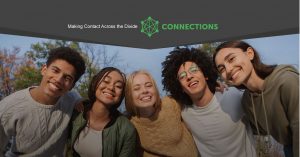How to Make Connections

In the 1960s and ‘70s at start of Seattle’s desegregations program, it didn’t matter whether students were in favor of busing or against it. Both bused and local students had a few things in common: we didn’t know how to talk to one another, how to treat one another, or in some cases, how to share the same space. There was no plan. Students were simply bused into schools and picked up at the end of the day.
Anything that happened between drop off and pick up was on the students, and sometimes it didn’t go that well. Some White students refused to sit next to Black students. “Whites Only” signs showed up over some drinking fountains. Lunchroom tables were segregated – and some still are.
Now, with Seattle schools more segregated than ever, students don’t even get the chance to try interacting with students who are different from them. Roosevelt Alumni for Racial Equity (RARE) wants to fix that.
Connections 101 is a course offered by RARE in conjunction with the Urban League of Seattle which will help students learn how to get to know one another, respect one another, and interact with ease. Connections 101 will be offered to students who plan to participate in Connections, RARE’s recreational programs to bring people together from different backgrounds.
The multi-part course will help participants navigate the rough parts of meeting new and different people and give them the tools to truly connect with each other. Skills learned will serve students in school and in life.
The program consists of six 90-minute sessions for students who plan to plan to join a Connections recreational program. The sessions will include:
- A review of the program’s purpose
- Exploring identity and community
- Discussion on the reality of race and racism
- Managing difficult conversations and interactions
- Taking care of ourselves
- How we can be responsible.
Students will need a notebook, writing utensils, and a willingness to participate in some soul-searching discussions. Participants will come away understanding:
- Connections’ purpose and community needs
- Understanding their place in the world
- Understanding race and racism at school, in their city and state
- Understanding privilege, knowing how to care for their physical and mental well-being
- And finally, be prepared to meet and interact with others in the recreational programs.
Connections’ goal is to bring students of different backgrounds together in a variety of fun educational and recreational events to practice making friends with people who are different from themselves. In an increasingly diverse world, we can no longer expect that people who are thrown together by chance to simply get along.
